高中英语必修3unit2 语法b3unit2Grammar
人教课标版高中英语必修3Unit2_Grammar_公开课课件

can/could
Ability(能力 ,“能/会”)
34
Probability/guessing(可能/推测 “有时会/可能”) 1 2
Request/permission (请求/许可 “可以”)
5
Translation: 我以前可以跑得比其他任何男生都快。但现在跑步测试都过不了。
I could run faster than any other boy student before. But I can’t pass the running test now.
the three kinds of food if we want to be healthy.
Homework
1. Exchange your letter with each other and try to polish your writing
2. Look through the functions of moral verbs and try to remember some important examples.
Yours sincerely,
Jack
Situation II : Asking for Advice
May I know I would appreciate it
Could you please Would you like
• __________your ideas?
• ________________if you could give me some advice.
How are things going in your college life?
wer(55241899) 2013-3-11 21:37:14
人教版高中英语必修3 Unit2 Grammar 名师课件

3. will and would
During the Spring festival time the whole family will come for dinner. intention intention
My uncle was poor but liked fashion, so he would often dress up as a rich man.
Step I Revision: Review what has been learnt in previous lessons. Make clear that we can use modal words in a sentence to show “intention, duty, permission, possibility, guessing and ability ”.
1. Underline the sentences containing modal verbs in the reading passage and use the function words below to explain the meaning of modal verbs.
Intention Possibility
there with our friends before that.
possibility
When going by plane, you should arrive at the
airport at least one hour early.
duty
It’s nearly time for class to start. The teacher
Duty Permission Guessing Ability
译林版高中英语选择性必修三Unit2 Grammar 练习 雅礼版
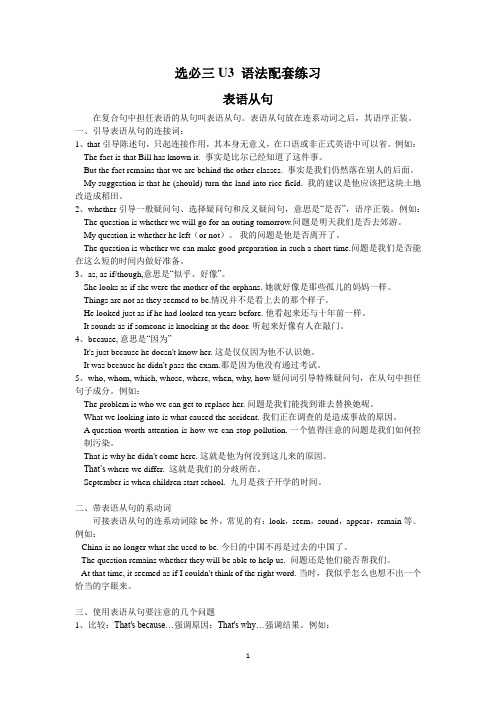
选必三U3 语法配套练习表语从句在复合句中担任表语的从句叫表语从句。
表语从句放在连系动词之后,其语序正装。
一、引导表语从句的连接词:1、that引导陈述句,只起连接作用,其本身无意义,在口语或非正式英语中可以省。
例如:The fact is that Bill has known it. 事实是比尔已经知道了这件事。
But the fact remains that we are behind the other classes. 事实是我们仍然落在别人的后面。
My suggestion is that he (should) turn the land into rice field. 我的建议是他应该把这块土地改造成稻田。
2、whether引导一般疑问句、选择疑问句和反义疑问句,意思是“是否”,语序正装。
例如:The question is whether we will go for an outing tomorrow.问题是明天我们是否去郊游。
My question is whether he left(or not)。
我的问题是他是否离开了。
The question is whether we can make good preparation in such a short time.问题是我们是否能在这么短的时间内做好准备。
3、as, as if/though,意思是“似乎、好像”。
She looks as if she were the mother of the orphans. 她就好像是那些孤儿的妈妈一样。
Things are not as they seemed to be.情况并不是看上去的那个样子。
He looked just as if he had looked ten years before. 他看起来还与十年前一样。
It sounds as if someone is knocking at the door. 听起来好像有人在敲门。
必修3unit2Grammar

C. have to
D. don’t have to
5. — May I take this book out of the
reading room?
— No, you ______. You read it in here.
(陕西2010)
A. mightn’t
B. won’t
C. needn’t
you invite him?
— Don’t worry. He ______ come. He
said he wasn’t certain what his plans
were.
(北京 2011)
A. must not
B. need not
C. would not
D. might not
2. I ______ worry about my weekend — I
You ought to have helped him with his English, ________? A. won’t you B. ought not you C. shouldn’t you D. wouldn’t you
2. must和have to must 的用法
1) 表示主观的义务和必要, 主要用于肯 定句和疑问句, 意思为“必须……, 得……,要……”;由must引起的疑 问句,肯定回答要用must或 have to, 否定回答要用needn’t 或 don’t have to, 意思是“不必” ;
2. Doctor: You are sick because you’ve eaten poisonous mushrooms. Where did you get them?
Lucy: I picked them in the forest. I know we _h_a_v_e_t_o_ eat fresh vegetables.
高中英语必修3unit2 语法b3unit2Grammar

Chang was not coming to eat in his restaurant as he always did.
6. He could not believe his eyes. 7. Perhaps he should go to the library and find out. 8. He could not have Yong Hui getting away
他或许会多给你一些帮助,即使他很忙。 He might have read about the news in the newspaper.
他可能已经从报纸上知道这个消息了。
ought to / should have done
本应该做而实际未做,有责备批评的意味。
意为“本应该…但…”
You should have told her the truth earlier.
He ought not to be so careless. Ought he to see the doctor? 表推测,按理应该,非常可能 If he started yesterday, he ought to be in Shanghai now. 如果他昨天出发的话,现在应该在上海了。
DD. needn't have gone
7. I didn't send out my application form last week, but I ____. A. had B. would do
英语人教版必修3课件:Unit 2Section Ⅲ— Grammar
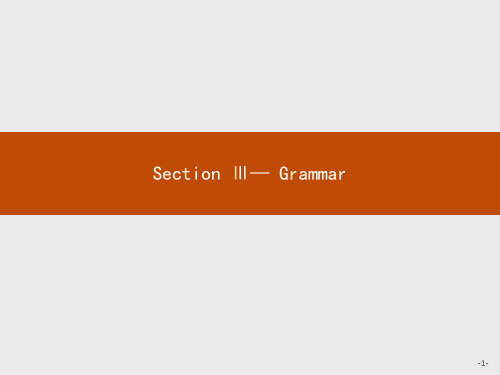
to/oughtn’t to,疑问式为:Ought I/you/he to...?常译作“应该,应当”。
语气比should稍重一些,表示有责任、义务等。
单句填空
I’m his teacher.I ought
(take) care of him.
答案:to take
They are having a class.You
6.will 7.can/can’t 答案:略
-2-
Section Ⅲ— Grammar
一二三
晨读晚诵
课课前前篇篇 自自主主预预习习
课堂篇 探究学习
随堂练习
二、用ought to,need,mustn’t完成句子
1.你应当向老师请求帮助。
You
ought to
ask your teacher for help.
单句填空
He ought to know what to do,
he?
答案:oughtn’t
3.表示推测,多指按照常理的一种推测,意为“按理应该……”。
翻译句子
已经九点了,他现在应该在办公室里。 翻译 答案:It is already 9 o’clock;he ought to be in his office now.
Ⅰ
Ⅱ
1.lose weight
A.失去兴趣
2.lose interest
B.丢脸;没有面子
3.lose heart
C.减肥
4.lose face
D.失去信心
-4-
Section Ⅲ— Grammar
晨读晚诵
课前篇 自主预习
课课堂堂篇篇 探探究究学学习习
随堂练习
-5-
高一英语必修3知识点unit2
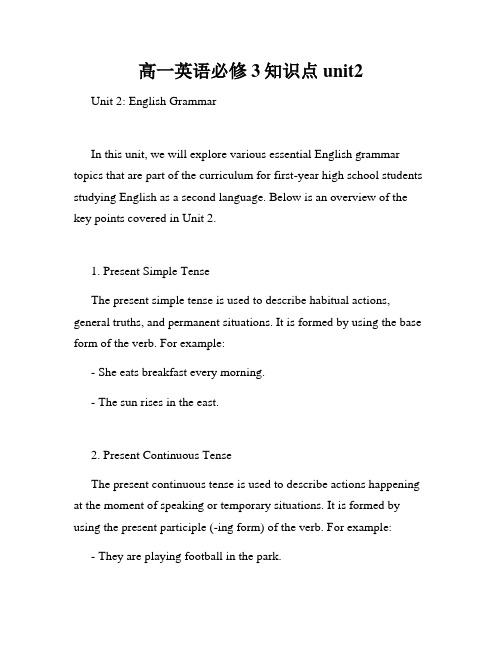
高一英语必修3知识点unit2 Unit 2: English GrammarIn this unit, we will explore various essential English grammar topics that are part of the curriculum for first-year high school students studying English as a second language. Below is an overview of the key points covered in Unit 2.1. Present Simple TenseThe present simple tense is used to describe habitual actions, general truths, and permanent situations. It is formed by using the base form of the verb. For example:- She eats breakfast every morning.- The sun rises in the east.2. Present Continuous TenseThe present continuous tense is used to describe actions happening at the moment of speaking or temporary situations. It is formed by using the present participle (-ing form) of the verb. For example:- They are playing football in the park.- She is currently studying for her exams.3. Past Simple TenseThe past simple tense is used to describe completed actions in the past. Regular verbs form the past tense by adding "-ed" to the base form of the verb, while irregular verbs have their unique forms. For example:- He walked to school yesterday.- They ate pizza for dinner last night.4. Past Continuous TenseThe past continuous tense is used to describe an ongoing action in the past. It is formed by using the past tense of "to be" (was/were) and the present participle (-ing form) of the main verb. For example:- I was watching TV when you called.- They were playing tennis at that time.5. Adverbs of FrequencyAdverbs of frequency describe how often an action occurs. They are commonly used with the present simple tense. Some examples are:- She always arrives on time.- They rarely go to the movies.6. Future TenseThe future tense is used to talk about actions that will happen in the future. It can be formed using "will" followed by the base form of the verb or by using "be going to" followed by the base form of the verb. For example:- I will visit my grandparents next weekend.- They are going to have a party next month.7. Modal VerbsModal verbs are auxiliary verbs used to express ability, possibility, necessity, permission, and advice. Some commonly used modal verbs include can, could, may, might, must, shall, should, will, would. For example:- You must finish your homework before watching TV.- She should study for the test if she wants to do well.8. Relative ClausesRelative clauses provide additional information about a noun in the main clause. They are introduced by relative pronouns such as who, whom, whose, which, and that. For example:- The book that I bought is very interesting.- The girl who is sitting next to me is my best friend.These are the main grammar points covered in Unit 2 of the first-year high school curriculum. Understanding and practicing these concepts will significantly improve your English language skills. Make sure to review and apply them in your speaking and writing to enhance your overall proficiency.。
新外研版高中英语必修三 Module 2 Grammar教学课件

表选择: or, otherwise等。如:
Seize the chance, or you will regret it.
表联合:and, when等。如: We should keep the room clean and tidy. 表因果:for, so等。如: It’s morning, for the birds are singing. 其他平行或对称结构: not …but …, both … and …, either … or …, neither … nor …, not only … but also …, would rather … than …等。如: Not only was everything in his classroom taken away , but also in his bedroom.
表结果:so, so that。如: It was very cold so that the water in the bowl froze.
表让步:though / although。如: Although / Though I live near the sea, I’m not a good swimmer. 表方式:as, as if / though。如: They talked as if they had been friends for years. 表比较:as … as, than。如: This river is ten times as long as that one.
Answers: (1) Yes (2) However (3) But (4) However
Linking these sentences with but or however.
人教版高一英语必修三unit2知识点
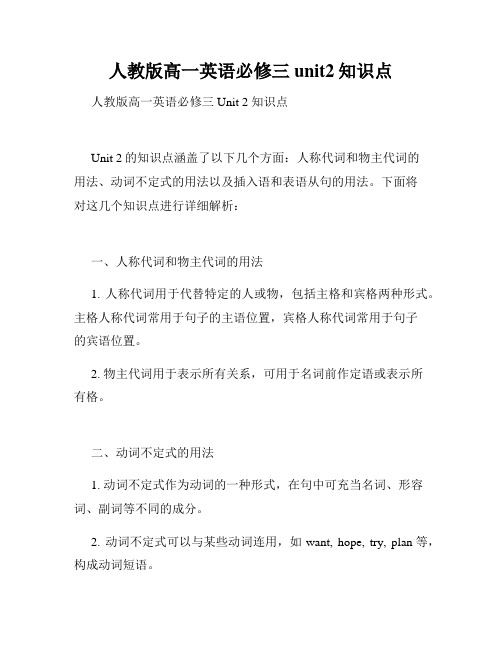
人教版高一英语必修三unit2知识点人教版高一英语必修三Unit 2 知识点
Unit 2的知识点涵盖了以下几个方面:人称代词和物主代词的
用法、动词不定式的用法以及插入语和表语从句的用法。
下面将
对这几个知识点进行详细解析:
一、人称代词和物主代词的用法
1. 人称代词用于代替特定的人或物,包括主格和宾格两种形式。
主格人称代词常用于句子的主语位置,宾格人称代词常用于句子
的宾语位置。
2. 物主代词用于表示所有关系,可用于名词前作定语或表示所
有格。
二、动词不定式的用法
1. 动词不定式作为动词的一种形式,在句中可充当名词、形容词、副词等不同的成分。
2. 动词不定式可以与某些动词连用,如want, hope, try, plan等,构成动词短语。
三、插入语的用法
1. 插入语是句子中的一种修饰成分,用于补充或强调某个句子成分,常置于句子中间或两个逗号之间。
2. 插入语可以是一个词、一个短语或一个从句。
四、表语从句的用法
1. 表语从句用来说明或补充主语或宾语的意思,一般由连词that, whether, if等引导。
2. 表语从句在结构上与主句相互独立,从句内部有自己的主语和谓语。
以上就是Unit 2的主要知识点,通过学习和掌握这些知识点,我们可以更好地理解和运用英语语法,提高我们的英语水平。
希望本篇文章对你的学习有所帮助。
人教课标版高中英语必修三 Unit2 Grammar 教案-新版
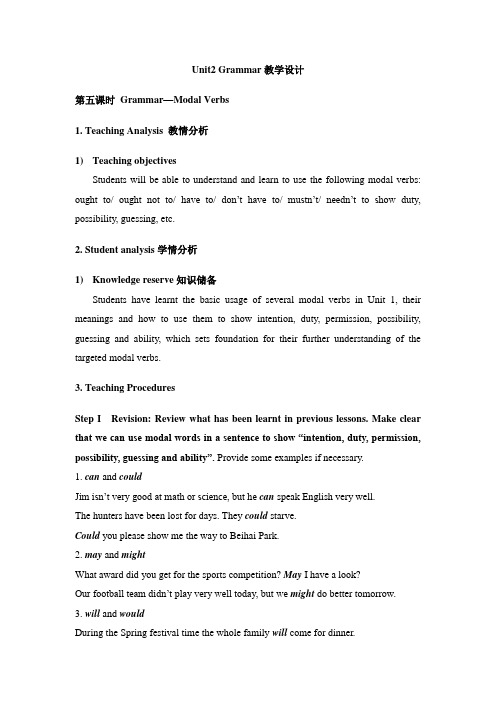
Unit2 Grammar教学设计第五课时Grammar—Modal Verbs1. Teaching Analysis 教情分析1)Teaching objectivesStudents will be able to understand and learn to use the following modal verbs: ought to/ ought not to/ have to/ don’t have to/ mustn’t/ needn’t to show duty, possibility, guessing, etc.2. Student analysis学情分析1)Knowledge reserve知识储备Students have learnt the basic usage of several modal verbs in Unit 1, their meanings and how to use them to show intention, duty, permission, possibility, guessing and ability, which sets foundation for their further understanding of the targeted modal verbs.3. Teaching ProceduresStep I Revision:Review what has been learnt in previous lessons. Make clear that we can use modal words in a sentence to show “intention, duty, permission, pos sibility, guessing and ability”. Provide some examples if necessary.1. can and couldJim isn’t very good at math or science, but he can speak English very well.The hunters have been lost for days. They could starve.Could you please show me the way to Beihai Park.2. may and mightWhat award did you get for the sports competition? May I have a look?Our football team didn’t play very well today, but we might do better tomorrow.3. will and wouldDuring the Spring festival time the whole family will come for dinner.My uncle was poor but liked fashion, so he would often dress up as a rich man.Are you free this Saturday? Would you like to join my family for dinner?4. shall and shouldThe harvest festival begins on Sunday. We shall be there with our friends before that. When going by plane, you should arrive at the airport at least one hour early.It’s nearly time for class to start. The teacher should be here soon.5. must and can’tWhen you eat fish, you must be careful with bones.Wang Feng has won the English competition three times. He must be very smart.A man landed on Mars? You must be joking. That can’t be true.习”使用Step ⅡUnderline the sentences containing modal verbs in the reading passage and label each sentence with the function of the modal verbs used—intention, duty, permission, possibility, guessing and ability. (page13, Exercise 1)1. Underline the sentences containing modal verbs in the reading passage and use the function words below to explain the meaning of modal verbs.Suggested answers:Then by lunchtime they would all be sold. (possibility)By now his restaurant ought to be full of people. (possibility)What could have happened? (possibility)Something terrible must have happened if… (guessing)I’ll help you lose weight… (intention)He could not believe his eyes. (ability)Perhaps he should go to the library and find out. (duty)He could not have Yong Hui getting away with telling people lies! (intention)He had better do some research. (duty)Even though her customers might get thin after eating Yo ng Hui’s food. (possibility) They would become tired very quickly. (possibility)…could win his customer back. (ability)Step ⅢExplain the meaning and basic usage of the following modal verbs:动”使用,以及时巩固已学知识。
人教版必修3高中英语必修3Unit2Grammar
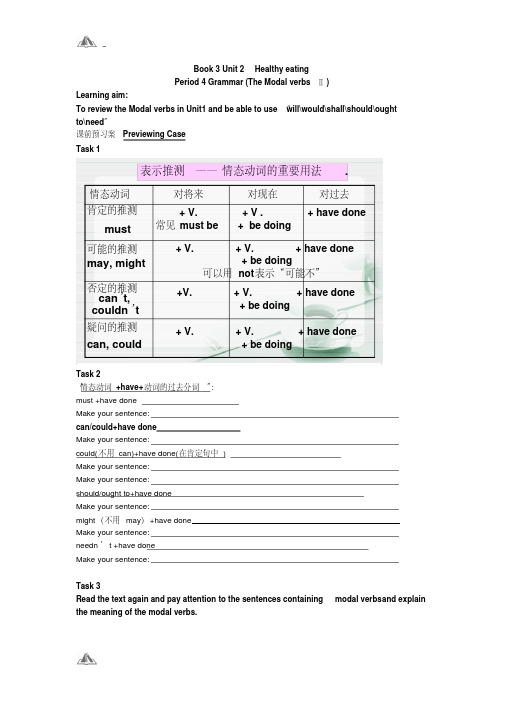
Book 3 Unit 2Healthy eating Period 4 Grammar (The Modal verbs Ⅱ)Learning aim: To review the Modal verbs in Unit1 and be able to use “will\would\shall\should\ought to\need ”课前预习案Previewing CaseTask 1表示推测——情态动词的重要用法.肯定的推测可能的推测否定的推测疑问的推测must对将来对现在对过去情态动词may, might can ’t, couldn ’t can, could+ V.+ V . + have done 常见must be + be doing + V. + V. + have done+ be doing可以用not 表示“可能不”+V. + V. + have done+ be doing+ V. + V. + have done+ be doing Task 2“情态动词+have+动词的过去分词”:must +have doneMake your sentence:can/could+have doneMake your sentence:could(不用can)+have done(在肯定句中)Make your sentence:Make your sentence:should/ought to+have doneMake your sentence:might (不用may )+have doneMake your sentence:needn ’t +have doneMake your sentence:Task 3Read the text again and pay attention to the sentences containingmodal verbs and explainthe meaning of the modal verbs.课堂探究案Exploring Cases探究点一: will和would:1. will是助动词或是情态动词?Will作助动词Will作情态动词I will tell you something important.Will you tell her that I'm here?2. 在疑问句中用于第二人称,提出请求或询问。
译林版高中英语必修3讲义Unit 2 Section Ⅲ Grammar——名词性从句(Ⅱ)与it作形式主语
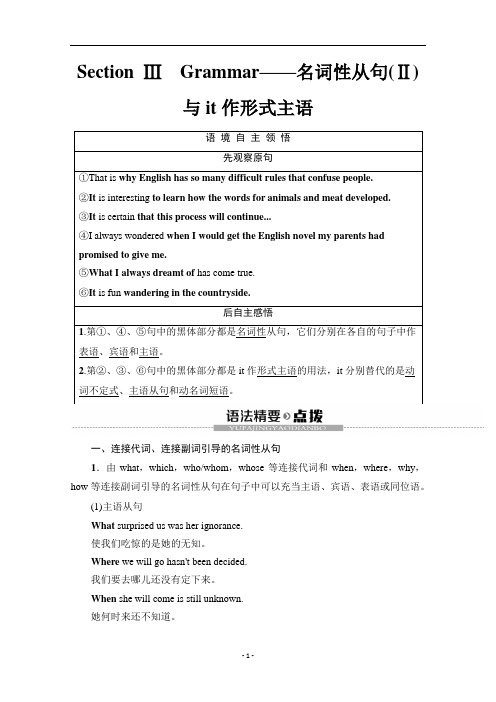
Section ⅢGrammar——名词性从句(Ⅱ)与it作形式主语语境自主领悟先观察原句①That is why English has so many difficult rules that confuse people.②It is interesting to learn how the words for animals and meat developed.③It is certain that this process will continue...④I always wondered when I would get the English novel my parents had promised to give me.⑤What I always dreamt of has come true.⑥It is fun wandering in the countryside.后自主感悟1.第①、④、⑤句中的黑体部分都是名词性从句,它们分别在各自的句子中作表语、宾语和主语。
2.第②、③、⑥句中的黑体部分都是it作形式主语的用法,it分别替代的是动词不定式、主语从句和动名词短语。
一、连接代词、连接副词引导的名词性从句1.由what,which,who/whom,whose等连接代词和when,where,why,how等连接副词引导的名词性从句在句子中可以充当主语、宾语、表语或同位语。
(1)主语从句What surprised us was her ignorance.使我们吃惊的是她的无知。
Where we will go hasn't been decided.我们要去哪儿还没有定下来。
When she will come is still unknown.她何时来还不知道。
(2)宾语从句The school was built on what used to be a wasteland.这所学校是在以前的荒地上建造的。
高中英语 人教版必修第三册 unit 2 grammar 课件

3.作伴随状语(动词-ing形式表示的动作与谓语动词表示的动作同时 发生,相当于一个并列谓语)
7
I wish you would quit complaining.我希望你不再抱怨。 Chatting with each other, we enjoyed our dinner.我们边吃边聊。 2.动词-ing形式的完成式,表示动作发生在谓语动词之前。 Having finished work, she got ready to go shopping. 完成工作后,她准备去购物。
They stood there, waiting for the bus. = They stood there and waited for the bus. 他们站在那儿等公共汽车。
5
4.作结果状语(表示自然而然的结果,不定式短语作结果状语表示事 与愿违的结果) The hospital has recently obtained new medical equipment, allowing more patients to be treated. 最近这家医院已经获得了新的医疗设备,能让更多的病人得到治疗。
Hearing the knock on the door, they stopped talking. = When they heard the knock on the door, they stopped talking. 听到有人在敲门,他们停止了谈话。
人教课标版高中英语必修3Unit2_Grammar_名师课件(一)

来吧,就要开始了 老
铁
前奏结束, 热情不要停
我希望
这是
最快乐
最热烈
的
谈判
谢谢大家
不是谈判 是情态动词!
Warming up
1. Analysis the meaning of the underlined part in each sentence
2. Try to translate these sentences. 1.I knew that I ought not to open the
letter, so I didn’t. 2. You should/ ought to have
answered this letter a week ago. Why didn’t you? 3. I should/ ought to have done it.
3.According to sentences, we can know characteristics of modal verbs.
Task 2:分析以下情态动词的用 法区别
1.I must go there. Because I want to attend the meeting.
2.I have to go there. Because I can’t get another choice.
Exercise 1
• 1.你应该按时来参加会议。 • 2.我们应该认识这位老师。 • 3.你必须让我们知道你的名字。 • 4.你不得不早点来,因为汽车时间是
我通3 知
情态动词,特别重要
别
废
话
认 1
真
1
听 1
1
课
完美
同学们
人教版高中英语新课标必修三M3 Unit 2 Grammar
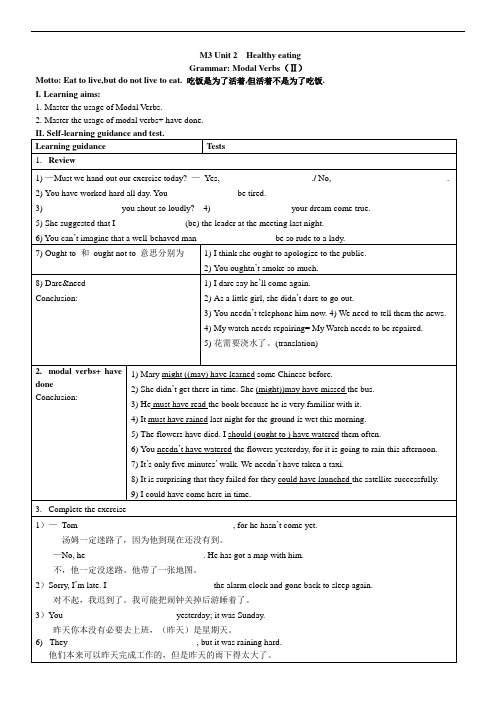
M3 Unit 2 Healthy eatingGrammar: Modal Verbs(Ⅱ)Motto: Eat to live,but do not live to eat. 吃饭是为了活着,但活着不是为了吃饭.I.Learning aims:1.Master the usage of Modal V erbs.2.Master the usage of modal verbs+ have done.Ⅲ. ConsolidationLevel A Complete the task with proper words.1.You ______________ go there alone; it’s too dangerous .(mustn’t/needn’t)2.I ________________ here in time but I met an friend of mine.I stopped and talked him for some time.(could have come/must have come)3.—Shall I leave the room so that you two can talk? —No,you__________________. (mustn’t/needn’t)4.He __________________have missed the train; he arrived at the train station two hours early.(can’t/needn’t)5.We’ll be very glad if you_________________ joining us in going camping.(can/may)6.They _________________ stay in the office last night because of the snowstorm.(have to /must )7.We ____________________ have helped him;in that case,he would have been able to finish the work.(should/can)8.From what you said,she __________________ have told you all about it.(can/must)9.Immediate actions ___________be taken ,like stopping cutting down trees,to better the environment.(may/ought to) Level B Complete the sentences.1.You ______________ private phone calls in work time. 在工作时间你不应该打私人电话。
高一英语必修三Unit2_Grammar课件
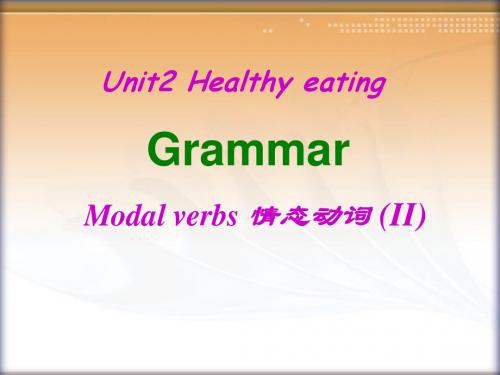
3 can 用于肯定句中, 可表示”有时可能”
情态动词 含义
否定式
注
意
点
表许可 mustn’t
口语中也可用can’t
may /
might
“可以”“不许,严禁”
表推测 May not “可能”“可能不” 主要用于肯定句, 不能用在疑问句
He daren’t to speak id he?
He daren’t speak English before such a crowd, dare he?
Nobody need to be afraid of catching the disease. Nobody need be afraid of catching the disease.
2.作实义动词用,常用在肯定句中, 有人称、 时态、和数的变化 He needs to go there himself. He has grown up,we don’t need to worry about him.
3.Sth (sb) need( want, request)+ doing/ to be done The house needs cleaning/ to be cleaned The boy needs sending to the hospital at once.
可兼做行为动词的情态动词:need 、 dare 1.作为情态动词用,常用在否定句和疑问句中。 Dare (need) +S +V S + daren’t (needn’t) +V I daren’t walk through the forest at night. Dare you walk through the forest at night? You needn’t return the book now. Need he go yesterday?
- 1、下载文档前请自行甄别文档内容的完整性,平台不提供额外的编辑、内容补充、找答案等附加服务。
- 2、"仅部分预览"的文档,不可在线预览部分如存在完整性等问题,可反馈申请退款(可完整预览的文档不适用该条件!)。
- 3、如文档侵犯您的权益,请联系客服反馈,我们会尽快为您处理(人工客服工作时间:9:00-18:30)。
Healthy eating
Discovering useful structures --- Modal Verbs (II)
Read the text and find out the sentences
containing modal verbs 1. Then usually by lunchtime they would all be sold. 2. By now his restaurant ought to be full of people. 3. What could have happened? 4. Nothing could be better … 5. Something terrible must have happened if Li Chang was not coming to eat in his restaurant as he always did.
need have done本需要做某事而实际未做 needn’t have done本不需要做某事而实际上做了
Tom need have cleaned the classroom instead of Lily this morrow. 今天早上汤姆本需要代替莉莉打扫教室的。 There was plenty of time. I needn’t have hurried. (But I hurried.) 时间很多,我本不需要着急的。 You needn’t have stayed here. 你本不需要留在这。
---No, it can’t.
“情态动词+have done”的用法
• “must+have+done”
• 表示对过去事情的肯定推测,译成“一定做过 某事”,该结构只用于肯定句。 You must have been mad to speak to the servant. 你和仆人说话,一定是发疯了。 I didn’t hear the phone, I must have been asleep. 我没听到电话,我一定是睡着了。
D. must have to study
3. The room is in a terrible mess; it
____cleaned.
A. can't have been A
B. shouldn't have been
C. mustn't have been D. wouldn't have been
--No, you don’t __________. have to
can &can’t (could &couldn’t)
1.表示能力 2.表示可能 He can (not) swim across that river.表能力
表可能时,can 常用于疑问句或否定句中
---Can the news be true?
might / may have done表示对过去发生的动
作进行的可能性推测。“可能已经” “也许已经”, He may have gone to the hospital. 他可能去医院了。 might的可能性更小。 He might have given you more help, even though he was busy.
4. As he had heart attack, he was told
that he ____ continue the work. A. needn't C. mustn't C B. may not D. can't
5. Two eyes ____see more than one.
A. can A
needn’t 对其它情态动词的回答: --Shall I tell John about it? --Must we do it now? --No, you __________. needn’t --No, you __________. needn’t
--No, you don’t __________. have to
and achieve new and greater
successes. A. Would B. Will
C. May C
D. Should
9. You ____ your tooth pulled out
before it rot completely.
A. had better got B. had to get better C. had better to get
D. can not have washed
2. John's score on the test is the highest
in the class; he____ last night.
A. should study B. should have studied
C. C must have studied
Modal Verbs (II) • ought(oughtn’t) to/ should(should’t) • have to /must • need/dare • can/can’t
ought to
“应该,要”,无人称时态和数的变化 He ought to come tomorrow. 否定式ought not to(oughtn’t to) 疑问式Ought sb to…? He ought not to be so careless. Ought he to see the doctor? 表推测,按理应该,非常可能 If he started yesterday, he ought to be in Shanghai now. 如果他昨天出发的话,现在应该在上海了。
1. You____ all those clothes! We have a
washing machine to do that sort of
thing.
A. needn't have washed A B. shouldn't have washed
C. must not have washed
ought (oughtn’t) to &should (shouldn’t) 表责任或者劝告“应该”,后者语气较强
There is something I ought to tell you before you leave. 在你们离开之前我有事要告诉你们。 You should have a rest after sports. 运动之后你应该休息一下。 had better 口语中常用,表示最好(做或不做某事) You had better stay here. 你最好呆在这里。
mustn’t don’t have to 禁止,不允许 不必(相当needn’t)
Must they do…? Yes, they must. No, they needn’t/don’t have to.
dare & need
need “需要”和dare“敢” 既可用作情态动词,也可 用作实义动词。 作情态动词主要用于否定句和疑问句。 You needn’t telephone him now. She dare not go out alone at night. 作实义动词时,可用于各种句式。 You don’t need to do it yourself. We need to tell them the news. He did not dare (to) look up. I dare say…为固定习语“我想,很可能,大概” I dare say he’ll come again. 大概他将会再来。
Dhad better get D.
注意对need问句的回答: --Need I finish the work today?
you must --Yes, ________________. you needn’t No, ________________. you don’t have to No, ________________.
6. He could not believe his eyes. 7. Perhaps he should go to the library and find out. 8. He could not have Yong Hui getting away with telling people lies! 9. Even though her customers might get thin after eating Yong Hui’s food … 10. They would become tired very quickly. 11. …he could win his customers back.
have (got) to
“不得不”有人称、时态的变化
Tom has to attend an important meeting this afternoon. 今天下午汤姆不得不参加一个重要的会议。
must
主观/客观 × ×
主观 现在,将来 √ √
C. will
B. may
D. should
6. You____ to town to see the film
yesterday. It will be on TV tonight. A. needn't go
B. had better not go
C. should not go D. needn't have gone D
他或许会多给你一些帮助,即使他很忙。 He might have read about the news in the newspaper. 他可能已经从报纸上知道这个消息了。
